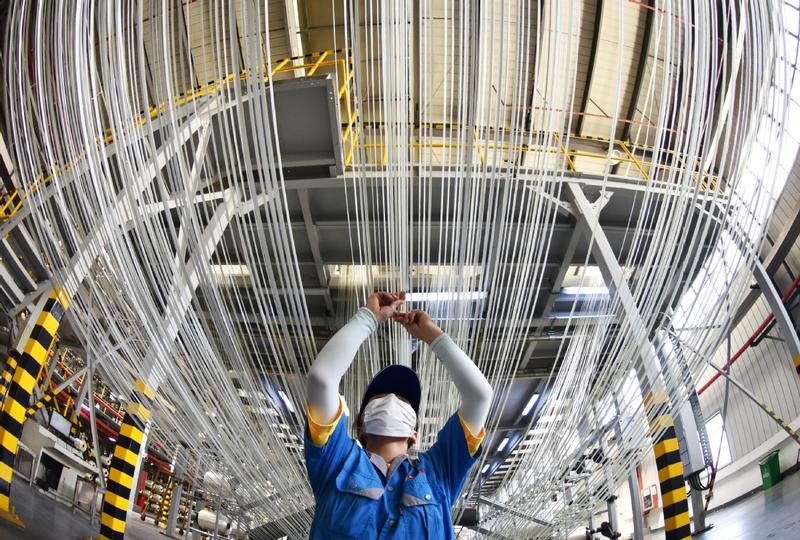 A worker checks the operation of a carbon fiber production line at a factory in Lianyungang, Jiangsu province. (GENG YUHE / FOR CHINA DAILY)
A worker checks the operation of a carbon fiber production line at a factory in Lianyungang, Jiangsu province. (GENG YUHE / FOR CHINA DAILY)
Despite heavy rainfall in some areas, China's services grew strongly in July, as evidenced by a spike in a key gauge, suggesting the sector is so resilient that it may probably have no trouble in withstanding the disruption brought by the latest wave of local COVID-19 cases, experts said on Wednesday.
The official PMI, released on Saturday by the National Bureau of Statistics, also indicated that the recovery in services has speeded up
The Caixin China General Services Purchasing Managers' Index, a private gauge of the sector's health, surged to 54.9 last month from 50.3 in June-and higher than the survey's all-time average of 54.1, media group Caixin said on Wednesday.
The 50-mark separates expansion from contraction. Buoyed by a growing services sector that offset the softening in manufacturing activities, the composite Caixin PMI, which covers both sectors, grew to 53.1 in July from 50.6 in June, pointing to a stronger rise in overall business activities.
Experts attributed the July rise in services mainly to two factors: the summer vacation that boosted consumption of services; and the release of pent-up demand after the containment of local COVID-19 cases in Guangdong province.
These have combined to offset the impact of heavy rainfall, they said. "As the epidemic in Guangdong province was brought under control, the recovery of services supply and demand accelerated in July," said Wang Zhe, a senior economist at Caixin Insight Group.
ALSO READ: Entertainment and media sector to see robust growth in China
The official PMI, released on Saturday by the National Bureau of Statistics, also indicated that the recovery in services has speeded up. The reading came in at 52.5 in July, compared with 52.3 a month earlier, driven by improvements in sectors like air transport, hospitality, catering and ecological protection.
However, experts said the readings may not have fully factored in the latest wave of local COVID-19 cases in Jiangsu province. The Caixin survey was conducted after the resurgence in Guangdong province was contained and before the outbreak in Jiangsu province.
"The resurgence of the COVID-19 cases in some parts of China since late July is expected to hurt August's PMI readings," Wang said.
The Chinese mainland reported 71 new locally transmitted COVID-19 cases in seven provinces and municipalities on Tuesday, official data showed on Wednesday.
Wang also cautioned against inflationary risks looking ahead, as input prices and prices charged by companies engaged in the services sector both rallied last month.
Wu Chaoming, chief economist at Chasing Securities, said the new infection wave may disrupt services in August, but the impact should be limited, with the PMI readings expected to stay in the expansion territory over the remainder of the year.
"China is expected to contain the resurgence in a relatively short period of time, thanks to timely measures against the new cases, fast vaccination, and the country's experience in dealing with the virus, including the recent combat against the Delta variant in Guangdong province," Wu said.
Lu Ting, Nomura's chief China economist, said he expects the new infection wave to be contained by mid-September or latest by late September, and tighter social distancing rules to be gradually eased in mid-October. Pent-up demand for services should find a release thereafter.
READ MORE: AI reshaping health and wellness sector
The recent stringent regulatory moves on tutoring by private-sector companies, data security and potential monopolies in the internet sector have sparked discussions whether there will be more policy moves for high-quality development, but which could weigh on short-term growth of the services sector.
Many experts said they believed that while tight regulations on certain sectors may continue, regulators will likely remain supportive of the services sector overall and are likely to unveil more measures to boost subsectors like sports and rural logistics.
"Regulations for certain sectors do not imply weaker support for the tertiary industries, which contribute to over 54 percent of China's GDP," said Meng Lei, an A-share strategist with UBS Securities.


